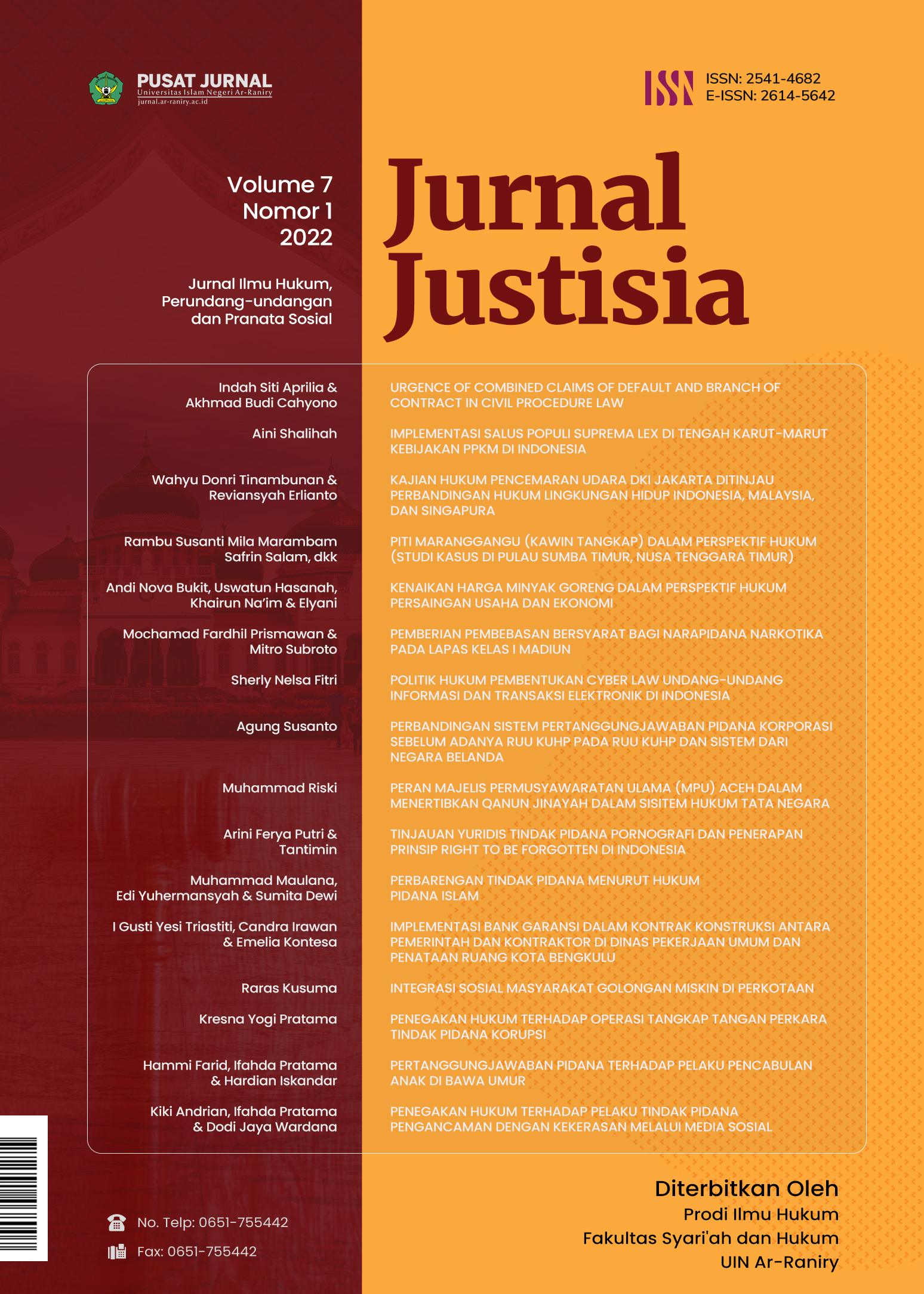Piti Maranggangu (Kawin Tangkap) dalam Perspektif Hukum
DOI:
https://doi.org/10.22373/justisia.v7i1.12869Abstract
Sumba Island holds a lot of local wisdom. One of the local wisdom is Piti Maranggangu. Piti Maranggangu is a catch / take in meetings that often occur in public places or public places, such as in traditional markets, places of customs activities (traditional parties), on the street, at home and even planted. The purpose of this study was to find out and understand Piti Maranggangu from the point of view of Customary Law and Law No. 1 of 1974 on marriage. The type of research used is socio-legal research with a research location in Sumba Island, East Nusa Tenggara. The results showed that Piti Mara interfered with a review of the principles of customary law that piti maranggangu practices are recognized in the sumba island community and is a form of honest exogamous mating mating system. Referred to as honest exogamy because the edited woman has been positioned as a surrogate in the clan. While Piti Maranggangu in the perspective of Law No. 1 of 1974 can be concluded that there are 2 (two) conditions violated in the marriage process, namely substantive conditions that there is no consent from the bride, then the age of the edited bride is underage (under 19 years). As a result of violating these substantive conditions, Piti Maranggangu can legally be void by law.
References
Adlhiyati, Zakki, and Achmad Achmad. “Melacak Keadilan Dalam Regulasi Poligami: Kajian Filsafat Keadilan Aristoteles, Thomas Aquinas, Dan John Rawls.” Undang: Jurnal Hukum 2, no. 2 (2020): 409–431.
Barcons Campmajó, María. “Forced Marriages in Europe: A Form of Gender-Based Violence and Violation of Human Rights.” The Age of Human Rights Journal 14, no. 14 (June 15, 2020): 1–18. https://www.scopus.com/inward/record.uri?partnerID=HzOxMe3b&scp=85091209012&origin=inward.
Bora, Y N, and N K Purawati. “Perkawinan Douna Uma Loka Masyarakat Desa Kalebu Ana Kaka, Kecamatan Tana Righu, Kabupaten Sumba Barat.” Social Studies (2019). https://ojs.ikippgribali.ac.id/index.php/socialstudies/article/view/563.
Fuady, Munir. Konsep Hukum Perdata. Depok: PT Rajagrafindo Persada, 2015.
Ihsan, M. “Kawin Paksa Perspektif Gender (Studi Terhadap Hak Memilih Calon Suami Oleh Perempuan).” Saree (2019). Https://Ejurnal.Iainlhokseumawe.Ac.Id/Index.Php/Saree/Article/View/513.
Kopong, G J. “Kekerasan Berbasis Gender: Telaah Teoritis ‘Kawin Tangkap’ Dalam Budaya Sumba (Ntt).” Jurnal Optimisme (2020). Http://Www.Jurnaloptimismepbs.Com/Index.Php/Jurnaloptimismepbs/Article/View/10.
Lolo, I U. “Dari Liturgi Baptisan Menuju Liturgi Kehidupan: Menjadi Gereja Bagi Perempuan Korban Kawin Tangkap.” KENOSIS: Jurnal Kajian Teologi (2020). http://e-journal.iaknambon.ac.id/index.php/KNS/article/view/181.
Mohsi, M. “Analisis Perkawinan Paksa Sebagai Tindak Pidana Kekerasan Seksual Dalam Rancangan Undang-Undang Penghapusan Kekerasan Seksual PKS.” Al-Adalah (2020). https://www.neliti.com/publications/326847/analisis-perkawinan-paksa-sebagai-tindak-pidana-kekerasan-seksual-dalam-rancanga.
Muhammad, Bushar. Pokok-Pokok Hukum Adat. Jakarta: Pradnya Paramita, 1988.
Salam, Safrin. “Dispensasi Perkawinan Anak Di Bawah Umur : Perspektif Hukum Adat , Hukum Negara & Hukum Islam.” Pagaruyuang Law Journal 1, no. 1 (2017): 110–124.
Sembiring, Rosnidar. Hukum Keluarga Harta Harta Benda Dalam Perkawinan. Jakarta: PT RajaGrafindo Persada, 2016.
Setiady, Tolib. Intisari Hukum Adat. Bandung: Alfabeta Bandung, 2009.
Syahrani, Riduan. Seluk Beluk Dan Asas-Asas Hukum Perdata. Bandung: PT Alumni Bandung, 2013.
Tekkas Kerman, Kader, and Patricia Betrus. “Violence Against Women in Turkey: A Social Ecological Framework of Determinants and Prevention Strategies.” Trauma, Violence, & Abuse 21, no. 3 (July 10, 2020): 510–526. https://www.scopus.com/inward/record.uri?partnerID=HzOxMe3b&scp=85048810072&origin=inward.
Downloads
Published
Issue
Section
License
The Authors submitting a manuscript do so on the understanding that if accepted for publication, copyright of the article shall be assigned to Jurnal Justisia : Jurnal Ilmu Hukum, Perundang-undangan dan Pranata Sosial, Ar-Raniry State Islamic University, Indonesia as the publisher of the journal.
Jurnal Justisia : Jurnal Ilmu Hukum, Perundang-undangan dan Pranata Sosial right of first publication with the work simultaneously licensed under Creative Commons Attribution-ShareAlike 4.0 International License (CC BY-SA 4.0) that allows others to share (copy and redistribute the material in any medium or format) and adapt (remix, transform, and build upon the material) the work for any purpose, even commercially with an acknowledgment of the work's authorship and initial publication in Jurnal Justisia : Jurnal Ilmu Hukum, Perundang-undangan dan Pranata Sosial. Authors are able to enter into separate, additional contractual arrangements for the non-exclusive distribution of the journal's published version of the work (e.g., post it to an institutional repository or publish it in a book), with an acknowledgment of its initial publication in Jurnal Justisia : Jurnal Ilmu Hukum, Perundang-undangan dan Pranata Sosial. Authors are permitted and encouraged to post their work online (e.g., in institutional repositories or on their website) prior to and during the submission process, as it can lead to productive exchanges, as well as earlier and greater citation of published work (See The Effect of Open Access).

